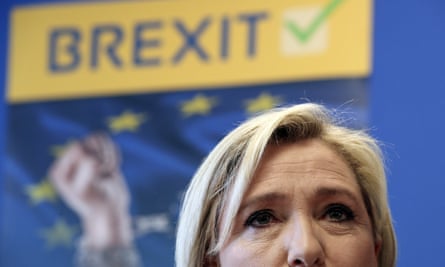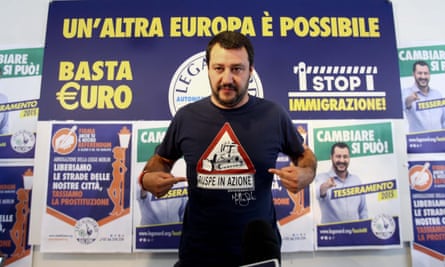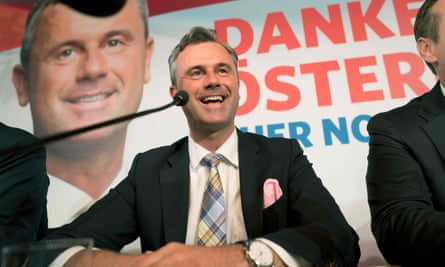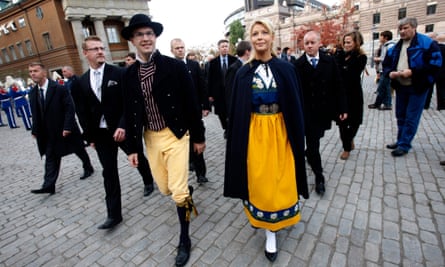Now there has been a vote for Brexit, there are calls in other countries for people to have their say on the European Union. But, though they have inherited the pithy naming formulation – from “Frexit” and “Nexit” through to “Oexit” – the proposed referendums vary depending on what they want, what they’re motivated by, and how likely they are to happen.
Netherlands

On Brexit morning, Nigel Farage suggested that the Netherlands might be the next country to quit the “dying” EU. “We may well be close, perhaps, to a Nexit,” he said.
However, a poll published on Sunday by peil.nl found a slim majority against holding a referendum (50% to 47%) but also, to Farage’s likely chagrin, a majority for staying in the EU (46% to 43%).
Among voters with the lowest educational profile the appetite for Nexit was much stronger – 69% favour holding a referendum and 64% would vote leave. “If a referendum is held we would expect that, just as in Britain, the turnout among lower educated voters will be relatively high,” said poll organiser Maurice de Hond.
Those voters are also more likely to support far-right leader Geert Wilders, whose Freedom party has a substantial lead in the opinion polls. Wilders pledged on Friday to make a UK-style referendum one of the key issues in the Dutch general election campaign next March.
A Nexit referendum before then is very unlikely. No other Dutch political party supports such a move and the prime minister, Mark Rutte, dismissed the idea as “utterly irresponsible”. He has urged his European colleagues to work towards a settlement with Britain that prioritises stability and “reflects the friendly cooperation of the last 40 years”.
France

Marine Le Pen, leader of the Front National, has suggested that France could follow Britain in leaving the EU, hailing the Brexit vote as the beginning of “a movement that can’t be stopped”.
Le Pen has said that if she wins the French presidential election next April, she will hold an in/out referendum on the country’s membership of the EU within six months. That, though, remains a big “if” – even though she is expected to comfortably reach the final round of the presidential runoff.
To all mainstream politicians, however, the idea of a Frexit is abhorrent. François Hollande, the president, is in favour of France remaining within the EU, as are his opponents on the centre-right. Hollande said in the wake of Britain’s vote: “This is a painful choice and it is deeply regrettable both for the UK and Europe.”
Italy

For Brussels, the biggest threat from Italy comes from the anti-establishment Five Star Movement, which recently had candidates elected as mayors of Rome and Turin and wants a referendum on leaving the eurozone.
Trouble is, no matter how much Beppe Grillo, the comedian who founded the M5S, might push the plebiscite, most Italians – 61% according to a poll in March – support remaining in the single currency.
The other main Eurosceptic force in the country is the anti-immigration Northern League, whose leader, Matteo Salvini, tweeted last week: “Hurrah for the courage of free citizens! Heart, brain and pride defeated lies, threats and blackmail. THANK YOU UK, now it’s our turn.”
Salvini said it was time for Italians to be allowed a referendum on the issue of EU membership and the party will start a petition calling for a referendum.
But the Northern League’s support is limited – at the last general election in 2013 it scored a miserable 4% – and its calls will not be heeded. The prime minister, Matteo Renzi, is a committed, if critical, Europhile who launched an emotional plea to the UK to vote remain on the eve of last week’s referendum.
Austria

Norbert Hofer, the far-right candidate who narrowly missed out on winning the Austrian presidential election last month, has said that his country should have a referendum on EU membership if, within a year, Brussels makes any moves towards political “centralisation” and fails to refocus on its original role as an economic and trade alliance.
The Austrian media have dubbed the potential vote “Auxit” or “Oexit” – a reference to Österreich, which means Austria in German. But the Austrian chancellor, Christian Kern, has said there will be no referendum.
Hofer, from the anti-immigration Freedom party (FPO), said in an interview on Sunday that the EU should be about economic rather than political cooperation and any moves toward centralisation should be resisted.
He has gone further in his comments than the FPO leader, Heinz-Christian Strache, who has said that an Austrian referendum on the issue might become a party objective in the future.
Hofer is challenging the result of the presidential election that he narrowly lost, alleging there were irregularities in the counting of postal ballots. However, even if the FPO’s challenge is successful, the president alone does not have the power to order a referendum.
Sweden

The leader of the anti-immigration Sweden Democrats, Jimmie Åkesson, has said he hopes that Sweden might be able to renegotiate its relationship with the EU and then hold a referendum on membership.
“I see nothing negative about leaving this supranational European Union,” said Åkesson, who has repeatedly called for Sweden to “become a sovereign state again”.
The Sweden Democrats hold the balance of power in Stockholm. The party attracted 12.9% of the vote in the 2014 election, but saw their support rise to about 20% last year as Sweden took in a record number of asylum seekers and tensions around immigration flared.
All of Sweden’s mainstream parties, including the Social Democrat-Green government and the centre-right opposition, the Moderates, support the Scandinavian country, which joined the EU in 1995 after a 1994 referendum, continuing as a member of the EU.
Germany
Beatrix von Storch, an MEP for the rightwing populist party Alternative für Deutschland (AfD), celebrated Brexit as “Great Britain’s independence day” and has previously called for a similar referendum to be held in Germany, saying the German people “should be given a voice”.
After the referendum result was announced on Friday, she also called for Martin Schulz, the president of the European parliament, and Jean-Claude Juncker, the head of the European commission, to resign.
However, despite a recent growith in support for the AfD, the German people remain broadly in favour of remaining in the union, with about 40% believing a referendum on the subject should be held and less than 35% saying they would vote to leave.
Denmark
The powerful far-right Danish People’s party (DPP), which hailed the Brexit vote as a “stinging slap to the whole system”, has said it wants a Danish referendum on less binding conditions of EU membership – not on membership itself.
But Denmark’s centre-right prime minister, Lars Løkke Rasmussen, who relies on the support of the DPP to prop up his minority administration, said there would be no such vote.
- This article was amended on 27 June 2016. An earlier version said a poll in the Netherlands found a slim majority in favour of holding a referendum (50% to 47%). It was the other way around. This has been corrected.

Comments (…)
Sign in or create your Guardian account to join the discussion